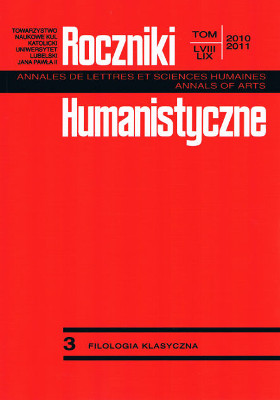Grecka bogini księżyca w świetle orfickiego Hymnu do Selene
Abstrakt
Hymn to Selene is one of 87 so-called Orphic hymns. Its addressee is goddess of the Moon, who is defined in the hymn both by the name Selene and Mene. Conducting the literary analysis of the above-mentioned hymn, we can notice that it consists of the invocation addressed to the goddess, many epithets revealing the greatness of the divinity and the prayer ending which in its contents resembles the invocation. It is worth mentioning that the basic part of the hymn includes some kind of litany catalogue of epithets by means of which the Hymn’s Author defines and describes the goddess Selene.
The literary analysis of the respective epithets which are present in the Hymn to Selene, allows to state that the picture of the goddess of the Moon included in it possesses very classic, known to us from mythology, features and also clearly seen orphic features. Undoubtedly, dual sexuality that the goddess Selene was attributed with in verse 4 is such a feature. The phrase ϑῆλυς τε καὶ ἄρσην is to be found in this verse. In this context we have the direct reference to the primeval orphic godhead, Fanes, who was a two-gender god. Thus, Selene is perceived as one of hypostasis of one and the only one divine creature which can be defined as “One”.
Basing on the results of the literary analysis, we can notice that the goddess Selene, who was not particularly popular with the ancient Greeks, was somehow re-discovered by Orphics, who saw her beauty through the person of the Hymn’s Author. Due to the fact that Selene was the goddess of the Moon by the light of which the orphic usually practiced their own rituals, certainly occupied much space in the orphic cult.
Bibliografia
Danielewicz J.: Epigramat – poezja liryczna – hymny orfickie – hymny Patroklosa, w: Literatura Grecji starożytnej. Epika – Liryka – Dramat, t. 1, red. H. Podbielski, Lublin: TN KUL 2005, s. 597-627.
Danielewicz J.: Morfologia hymnów orfickich, Poznań UAM 1976.
Gajda J., Dziubiński J., Orzechowski A.: Hymny orfickie. Prawda. Prehistoria pojęcia. Studia z filozofii starożytnej (III) (Filozofia XIX), Wrocław: Wydawnictwo Uniwersytetu Wrocławskiego 1993.
Graves R.: Mity greckie, przeł. H. Krzeczkowski, Warszawa: Państwowy Instytut Wydawniczy 1992.
Grimal P.: Słownik mitologii greckiej i rzymskiej, red. wyd. pol. J. Łanowski, Wrocław-Warszawa-Kraków: Zakłady Narodowe im. Ossolińskich Wydawnictwo 2008
Jurewicz O.: Słownik grecko-polski, t. 1-2, Warszawa: Wydawnictwo Szkolne PWN 2001.
Kerényi K.: Mitologia Greków, przeł. R. Reszke, Warszawa: Wydawnictwo KR 2002
Krokiewicz A.: Studia orfickie, (Biblioteka Meandra 3), Warszawa 1947.
Kubiak Z.: Mitologia Greków i Rzymian, Warszawa: Świat Książki 2005.
Kulig K.: Papirus z Derveni (Przekład), „Studia Antyczne i Mediewistyczne” 3 [38] (2005), s. 5-17.
Orphei Hymni, ed. W. Quandt, Berlin: Weidman, 1973.
Olinkiewicz E., Radzymińska K., Styś H.: Słownik języka polskiego, Wrocław: Wydawnictwo Europa 2003.
Parandowski J.: Mitologia. Wierzenia i podania Greków i Rzymian, Londyn: Plus 1992.
Reale G.: Historia filozofii starożytnej, t. I, Od początków do Sokratesa, tł. I. Zieliński, Lublin: RW KUL 2000.
Rzehak W.: Mitologia. Wierzenia Greków i Rzymian, Kraków: Greg 2004.
Schmitz L.: Selene, w: A Dictionary of Greek and Roman Biography and Mythology, vol. III, ed. W. Smith, London-New York: I.B. Tauris 2007, s. 768.
Spychała J.M.: Orfeusz i orficy – zarys problematyki, „Klio” (2003), z. 4, s. 3-24.
Swieżawski S.: Dzieje europejskiej filozofii klasycznej, Warszawa–Wrocław: Wydawnictwo Naukowe PWN 2000.
Świercz P.: Jedność wielości, Katowice: Wydawnictwo Uniwersytetu Śląskiego 2008.
ΥΜΝΟΙ ΟΜΕΡΙΚΟΙ czyli Hymny Homeryckie, przekł. i oprac. W. Appel, Toruń: Algo 2001.
Vaux R. de: Instytucje Starego Testamentu, t.1-2, przeł. T. Brzegowy, Poznań: Pallottinum 2004.
Zamarovský V.: Bogowie i herosi mitologii greckiej i rzymskiej, tł. J. Illg, L. Spyrka, J. Wania, Warszawa: Świat Książki 2003.
Copyright (c) 2011 Roczniki Humanistyczne

Utwór dostępny jest na licencji Creative Commons Uznanie autorstwa – Użycie niekomercyjne – Bez utworów zależnych 4.0 Międzynarodowe.





